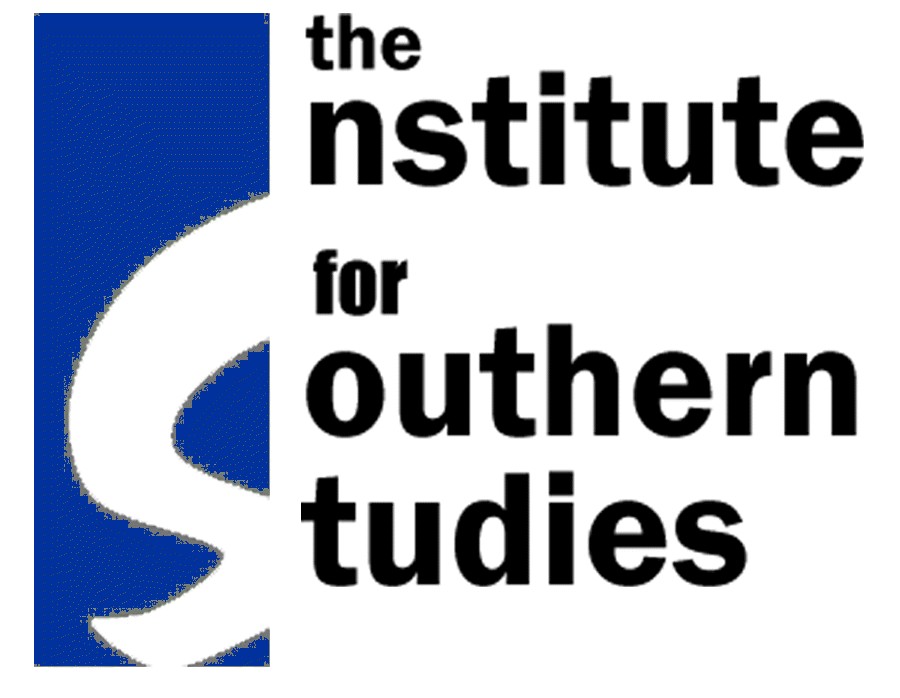- Institute for Southern Studies
Infobox Organization
name = Institute for Southern Studies
size = 200px
caption =
motto = A New Vision for a Changing South
formation = 1970
type = Non-profit research, education and media center
headquarters = Durham, North Carolina, USA
location =
membership =
language = English
leader_title = Executive Director
leader_name = Chris Kromm
key_people =Julian Bond , Ajamu Dillahunt, Desiree Evans, MaryBe McMillan, Pam Spaulding, Jane Stein, Sue Sturgis, Kerry Taylor,Timothy Tyson
num_staff =
budget =
website = http://www.southernstudies.orgThe Institute for Southern Studies is a non-partisan, non-profit research and media center based in
Durham, North Carolina that advocates for progressive political and social causes in theSouthern United States . The Institute was founded in 1970 by veterans of the U.S. civil rights movement, includingJulian Bond , Bob Hall, Howard Romaine and Sue Thrasher. Since 2000, the Institute's executive director has been Chris Kromm, who has worked in the South as a journalist and public interest advocate since 1992.Research and Education Programs
The Institute has worked on a wide range of issues, including economic justice, civil rights, environmental protection and democratic reform. Recent Institute initiatives have included (1) Gulf Coast Reconstruction Watch, a project tracking the aftermath of
Hurricane Katrina ; (2) the Peace and Security Program, which has examined the South's disproportionate ties to the military and theIraq war ; and, (3) the Environment and Energy Reporting Project, launched in 2008, which examines the political and economic influence of the energy industry in the South.The Institute has published a series of influential reports on
Hurricane Katrina , its social, political and environmental aftermath, and the state of the post-storm recovery. Key reports include:* The Mardi Gras Index (February/March 2006), a widely-used set of statistics on the state of Katrina recovery;
* [http://www.reconstructionwatch.org/images/One_Year_After.pdf One Year after Katrina] (August/September 2006), a book-length report examining the status of housing, jobs, health care, education and other key issues;
* [http://www.southernstudies.org/NewAgendaGulf.pdf A New Agenda for the Gulf Coast] (February/March 2007), a set of policy proposals for a just and speedy recovery;
* [http://www.southernstudies.org/gulfblueprint.pdf Blueprint for Gulf Renewal] (August/September 2007), featuring interviews with 20 grassroots organizations in the Gulf Coast and their prescriptions for policy change;
* [http://www.southernstudies.org/ISSKatrinaHumanRightsJan08.pdf Hurricane Katrina and the Guiding Principles on Internal Displacement] (January 2008), a report produced in conjunction with the
Brookings Institution , highlighting the need to bring U.S. disaster policy in line with international human rights law.outhern Exposure
In 1973, the Institute began publishing "Southern Exposure", a journal covering a broad range of political and cultural issues, with a special emphasis on
investigative journalism andoral history ."Southern Exposure" has been recognized with numerous major journalism awards, including two
George Polk Awards (Magazine Reporting and Regional Reporting), aNational Magazine Award (Public Interest Reporting), the John Hancock Award for Excellence in Business and Financial Journalism, and awards fromInvestigative Reporters and Editors , theNational Press Club , theSociety of Professional Journalists , and theWhite House Correspondents' Association .Notable authors who have contributed to "Southern Exposure" include
Julian Bond ,Anne Braden ,Denise Giardina ,Jim Hightower ,Bernice Johnson Reagon ,Stetson Kennedy ,Mab Segrest ,Lee Smith ,Studs Terkel andAlice Walker . "Southern Exposure" published quarterly from 1973-2000 and 2002-2005. The Institute now publishes two special "Southern Exposure" reports a year.In 2003/2004, "Southern Exposure" published "Banking on Misery," an award-winning investigative series that was one of the first in-depth reports on the growing
predatory lending crisis, especially the leading role ofCitigroup in predatory banking practices. TheColumbia Journalism Review later credited "Southern Exposure" with breaking the story about Citigroup's dependence onsubprime lending (three out of four loans originating from Citigroup in 2000 were from its subprime unit, "Southern Exposure" reported) and foreshadowing the 2007/2008 home credit crisis. [Dean Starkman, "Tale of Two Citis," Columbia Journalism Review, October 3, 2007]Facing South Newsletter and Blog
Since 2000, the Institute has published a regular email newsletter, Facing South . In 2005, the Institute began a daily blog, also called Facing South [http://www.southernstudies.org/facingsouth] , which covers a wide range of political and social issues. [Dan Mitchell, "Going South," The New York Times, June 18, 2005] [Katrina vanden Heuvel, "Facing South," The Nation, February 23, 2005] Facing South's regular contributors are Chris Kromm, executive director of the Institute; Sue Sturgis, a former reporter for
The News & Observer (Raleigh) and The Independent Weekly; and Desiree Evans, a former policy analyst forTransAfrica Forum .In April/May 2008, Facing South drew widespread attention for breaking the story about illegal and allegedly deceptive election practices by
Women's Voices Women Vote , a non-profit group in Washington, D.C. with close ties toBill Clinton andHillary Clinton . Media coverage resulting from Facing South's investigative report appeared onABC News ,The Charlotte Observer ,CNN ,The Economist , Harpers',Politico ,Salon ,TPM Muckraker ,The Washington Post , Wired, and dozens of other major outlets.The Institute has announced plans to launch an online magazine in 2008.
External links
* [http://www.southernstudies.org/ Institute for Southern Studies] , official website
* [http://www.southernstudies.org/facingsouth Facing South] , Institute blog
* [http://www.southernstudies.org/gulfwatch Gulf Coast Reconstruction Watch]References
Wikimedia Foundation. 2010.
